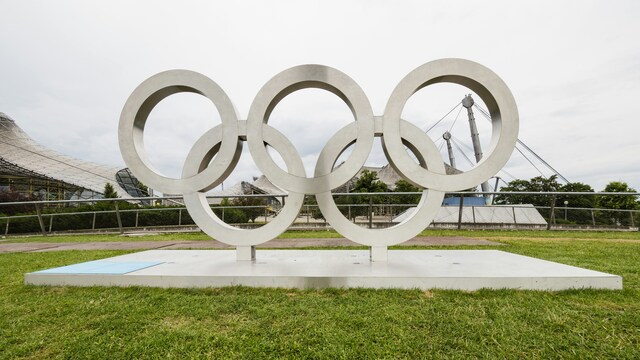Creatures of a day! What is anyone? What is he not? A man is but the dream of a shadow.
Yet, when the brightness comes as a gift from heaven, there is a shining light upon men, and a gentle life.
Ancient Greek poet Pindar from Olympian Odes.
The opening ceremony of the 33rd Olympiad in Paris defied conventions of a stadium based event and instead transformed the city’s many recognizably famous landmarks and the River
Seine into a grand stage to offer an eclectic mix of performances: sometimes spectacular, sometimes kitsch and sometimes even a little weird.
The concept of the Olympic torch relay was introduced for the first time at the 1936 Berlin Olympics the relay seen as symbolizing the connection between the ancient Greek ideals of physical prowess and the Nazi ideology of Aryan supremacy.
It was intended to present the Nazi regime as the inheritor and protector of these ancient traditions.
At this point, the torch relay has been completely disassociated from its Nazi past, but it has occasionally sparked controversy over the years.
The Torch is now seen as a “symbol of international brotherhood.”
There is always something stirring about the moment the Olympic cauldron is lit to signify that the Games have begun.
The International Olympic Committee says the flame “is a manifestation of the positive values that Man has always associated with the symbolism of fire and thus makes the link between the ancient and the modern Olympic Games.”
Many will possibly be reminded of when Cathy Freeman experienced a brief technical glitch while lighting the cauldron at the Sydney 2000 Olympics.
Despite this hiccup, the moment remained powerful and symbolic, with Freeman’s role highlighting the significance of reconciliation and unity in Australia.
For many, the next two weeks will be a period of watching and cheering the home team and counting the medal tally and our place on the leader board.
There will be the usual team of media cheerleaders.
To be proud of our athletes is positive but a descent into jingoism should be avoided.
Moreover, not everybody regards the Games positively. Today one of the most stringent criticisms is the cost of the event, particularly for the host nation.
The latest estimate of the budget for the Paris Olympics is $9.7 billion and yet less costly then London, $16.8 billion, Rio’s financial disaster at 23.6 billion)and Tokyo over 13.7 billion.
Among the biggest costs are the investments in Infrastructures that often turn into white elephants and have little to do with the real needs of local people.
Add to that the cost of providing a safe environment for athletes, visitors and locals.
In Paris, 35,000 police officers are being employed each day with a peak of 45,000 for the opening ceremony.
The attacks on the Paris fast trains showed that vigilance was indeed necessary.
Often the perceived long lasting commercial benefits have resulted in less than sensible actions: Greece tore up 2000 year old ruins, Russia trashed n entire village and London abandoned its carbon mitigating goals.
Underlying the Greek Games in Olympia in 776BC was the rule that all; hostilities between states were to cease.
A worthy requirement but sadly not adhered to in the modern Olympics.
Nevertheless, the goal of the modern Olympic movement is still to contribute to building a peaceful and better world by educating youth through sport, fair play and no discrimination of any kind.
This goal has remained elusive as Games in the past have been politicized `The 1936 games are remembered for Hitler’s propaganda to promote Aryan superiority’.
Jesse Owens showed otherwise, becoming the first American of any race to win four gold medals in track and field in a single Olympics, an achievement that stood till 1984.
The 1972 Summer Games in Munich saw the death of two Israeli athletes killed and nine taken hostage and later killed.
The Cold War saw a ban on the 1980 Moscow Games for the Soviet invasion of Afghanistan, followed by a retaliatory boycott of the Los Angeles Games in 1984.
In the 1968 Mexico City Olympics, Australian sprinter and silver medallist Peter Norman stood on the podium alongside Tommie Smith and John Carlos, the American athletes who had finished first and third, respectively.
During the medal ceremony, Smith and Carlos famously raised their gloved fists in a Black Power salute to protest racial discrimination and human rights abuses.
Norman showed his support for their cause by also raising his arm in a Black Power salute.
By doing so, Norman demonstrated his solidarity with Smith and Carlos’s protest against racial inequality and injustice.
This gesture was a courageous act of support, especially considering the potential backlash he could face in his home country of Australia.
And he did, facing significant criticism and ostracism, but stayed true to his belief in social justice for all.
Over the years, athletes have become faster and stronger: Citius, Altius, Fortius.
The 1992 inclusion of professional athletes in the Olympics led to a significant evolution in the quality, popularity, and commercial success of the Games while raising the bar for athletic excellence.
The intensive training regimes, improved attire for swimmers and athletes, nutritional supplements, and of course regrettably the growing prevalence of banned performance enhancing substances undoubtedly played a part.
But this also raises the question: How much can or should a human body be pushed and to what end?
As Maya Angelou puts in The Runner’s Lament:
Legs weary, aching, I strain,
Pushing through the pain,
Body and mind locked in a race,
Searching for that sacred space.”
And this brings us to who benefits from the Olympics in its present form?
The International Olympic Committee (IOC) has faced several allegations and instances of corruption over the years.
In response the IOC has undertaken various reforms aimed at enhancing transparency, accountability, and governance.
Corporate influence on the Olympic Games and the IOC is also significant and multifaceted, with both positive and negative impacts.
Major multinational companies like Coca-Cola, Visa, Samsung, and others gain exclusive marketing rights and extensive global exposure.
The Olympic Games may seem to many as having reached their use by date.
But does that mean it’s irredeemable.
Surely it’s possible to keep the best elements that suit our globalized world and recall Pierre de Coubertin’s vision of the modern Olympics as ‘a peace movement.’
Suggestions to do this abound. Imagine moving away from a single location and using the most suitable and most cost effective existing venues, doing away with flags and corporate sponsorship and just allowing the naturally talented youth of the world to come together in a spirit of celebration. Idealistic?
With every stride, I’m breaking free,
The world a blur, just me and glee,
Heart pounding, legs feeling light,
I soar through space, taking flight.
From The Sprinter’s Euphoria” by Langston Hughes
And as former British Poet Laureate Carol Duffy reminds us: “The original Olympics involved poetry as well as sport, celebrating the wholeness of human endeavour. I think it makes us healthier, as well as our running, jumping and marvellous physical achievements, to look more internally at art, music and poetry. As was the case in the Ancient Games.
Woorilla Poetry Prize 2024 is is open for submissions.
Please visit woorilla.org.au







